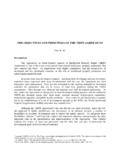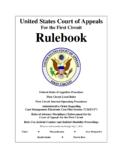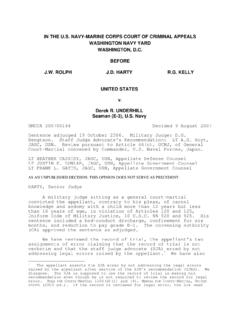Transcription of IN THE SUPREME COURT OF INDIA CRIMINAL APPELLATE ...
1 REPORTABLEIN THE SUPREME COURT OF INDIACRIMINAL APPELLATE JURISDICTIONCRIMINAL APPEAL NOS. 1375-1376 OF 2013 ASIAN RESURFACING OF ROAD AGENCY PVT. LTD. & ANR..AppellantsVERSUSCENTRAL BUREAU OF INVESTIGATION ..RespondentWITHC riminal Appeal , 1377/2013, 1382/2013,1394/2013, 1384/2013, 1393/2013, 1386-1387/2013, 1385/2013,1406/2013, 1396/2013, 1395/2013, 1391/2013, 1389/2013,1388/2013, 1398/2013, 1397/2013, Special Leave Petition (Crl.) , CRIMINAL Appeal Nos. 1390/2013, 1399/2013,1402/2013, 1400/2013, 1401/2013, 1404/2013, 1403/2013,1405/2013, Special Leave Petition (Crl.) Nos. 6835/2013,6834/2013, 6837/2013, CRIMINAL Appeal , SpecialLeave Petition (Crl.)
2 , 9652-9653/2013, CRIMINAL Appeal No. 234/2014, Special Leave Petition (Crl.) , 1451/2014, 1399/2014, 2508/2014, 2970/2014,2507/2014, 2939/2014, 2977/2014, 4709/2014, 6372/2014,6391/2014, 6691-6692/2014 and 9363 U D G M E N TAdarsh Kumar Goel, APPEAL OF appeals have been put up before this Bench of threeJudges in pursuance of order of Bench of two Judges dated 9thSeptember, 2013 as follows: Leave counsel for the parties are agreedthat there is considerable difference ofopinion amongst different Benches of thisCourt as well as all the High Courts. Mr. RamJethmalani, learned Senior Counsel appearingfor petitioner in CRIMINAL Appeal arising out ofSpecial Leave Petition ( CRIMINAL ) of2012 submits that the subsequent decisionsrendered by the two-judge Benches are perincuriam, and in conflict with the ratio of lawlaid down in the Constitution Bench decisionin Mohanlal Maganlal Thacker v.
3 State ofGujarat [(1968) 2 SCR 685].In this view of the matter, we are of theopinion that it would be appropriate if thematters are referred to and heard by a largerBench. Office is directed to place thematters before the Hon ble the Chief Justiceof INDIA for appropriate the meantime, further proceedings beforethe trial COURT shall remain stayed. the question of law to be determined is identical in allcases, we have taken up for consideration this matter. In the lightof answer to the referred question this as well as all other mattersmay be considered for disposal on merits by the facts first. dated 7th March, 2001 has beenrecorded with the Delhi Special Police Establishment.
4 CBI/SIU-VIII/New Delhi Branch under Section 120B read with Sections 420,467, 468, 471 and 477A of IPC and Section 13(2) read with 13(1)(d) of the Prevention of Corruption Act, 1988 (the PC Act) at theinstance of Municipal Corporation of Delhi (MCD) against theappellant and certain officers of MCD alleging causing of wrongfulloss to the MCD by using fake invoices of Oil Companies relatingto transportation of Bitumen for use in Dense Carpeting Works of roads in Delhi during the year 1997 and investigation, charge sheet was filed against theappellant and certain employees of MCD by the respondent-CBIbefore the Special Judge, CBI, New Delhi on 28th November, appellants filed an application for discharge with the Special3 Judge, CBI.
5 On 1st February, 2007, the Special Judge, CBI directedframing of the charges after considering the material before theCourt. It was held that there was a prima facie case against theappellant and the other accused. The appellants filed CriminalRevision No. 321 of 2007 before the Delhi High COURT against theorder framing charge. The Revision Petition was converted intoWrit Petition ( CRIMINAL ) of 2010. Single Judge referred the following question of lawfor consideration by the Division Bench: Whether an order on charge framed by aSpecial Judge under the provisions ofPrevention of Corruption Act, being aninterlocutory order, and when no revisionagainst the order or a petition under Section482 of lies, can be assailed underArticle 226/227 of the Constitution of INDIA ,whether or not the offences committedinclude the offences under Indian Penal Codeapart from offences under Prevention ofCorruption Act?
6 Learned Single Judge referred to the conflicting viewstaken in earlier two single Bench decisions of the High COURT inDharambir Khattar versus Central Bureau of4 Investigation1and Sabharwal versus Central Bureauof Investigation2. It was observed : However, since there are two views, oneexpressed by the Bench of Justice Jain in 's (supra) case and one held by theBench of Justice Muralidhar in DharamvirKhattar's case (supra) and by this Bench, Iconsider that it was a fit case where a LargerBench should set the controversy at rest. Dharambir Khattar (supra), the view of learned SingleJudge is as follows : 32.
7 To conclude this part of the discussion itis held that in the context of Section 19(3)(c)the words "no COURT shall exercise thepowers of revision in relation to anyinterlocutory order passed in any inquiry, " includes an interlocutory order in theform of an order on charge or an orderframing charge. On a collective reading ofthe decisions in Shukla and SatyaNarayan Sharma, it is held that in terms ofSection 19(3)(c) PCA, no revision petitionwould be maintainable in the High Courtagainst order on charge or an order framingcharge passed by the Special COURT . 33. Therefore, in the considered view of thisCourt, the preliminary objection of the CBI tothe maintainability of the present petitions isrequired to be 1 159 (2009) DLT 6362 166(2010) DLT Sabharwal (supra), another learned Single Judgeheld that even though no revision may lie against an interlocutoryorder, there was no bar to the constitutional remedy underArticles 226 and 227 of the Constitution.
8 At the same time, powerunder Section 482 could not be exercised in derogation of expressbar in the statute in view of decisions of this COURT in CBI versusRavi Shankar Srivastava3, Dharimal Tobacco Products Ors. versus State of Maharashtra and , MadhuLimaye versus The State of Maharashtra5, Krishnanversus Krishnaveni6 and State versus Navjot Sandhu7. was observed : 37. In view of the authoritativepronouncement of the Hon'ble SupremeCourt in the case of Navjot Sandhu (supra),coupled with its earlier decisions in the caseof Madhu Limaye (supra), it cannot bedisputed that inherent powers of the HighCourt, recognized in Section 482 of the Codeof CRIMINAL Procedure, cannot be used whenexercise of such powers would be inderogation of an express bar contained in astatutory enactment, other than the Code ofCriminal Procedure.
9 The inherent powers ofthe High COURT have not been limited by any3 (2006)7 SCC 1884 AIR 2009 SC 10325 (1977) 4 SCC 5516 (1997) 4 SCC 2417 (2003) 6 SCC 6416other provisions contained in the Code ofCriminal Procedure, as is evident from theuse of the words ?Nothing in this Code? inSection 482 of the Code of CriminalProcedure, but, the powers under Section482 of the Code of CRIMINAL Procedure cannotbe exercised when exercise of such powerswould be against the legislative mandatecontained in some other statutory enactmentsuch as Section 19(3)(c) of Prevention ofCorruption Act.
10 "29. The fact that the procedural aspect asregards the hearing of the parties has beenincorporated in Section 22 does not reallythrow light on whether an order on chargewould be an interlocutory order for thepurposes of Section 19(3)(c) PCA. A collectivereading of the two provisions indicates that inthe context of order on charge an orderdischarging the accused may be an orderthat would be subject-matter of a revisionpetition at the instance perhaps of theprosecution. Since all provisions of thestatute have to be given meaning, aharmonious construction of the threeprovisions indicates that the kinds of orderswhich can be challenged by way of a revisionpetition in the High COURT is narrowed downto a considerable extent as explained in thecase of Satya Narayan Sharma.






![[2013] 2 S.C.R. 1 2 SUPREME COURT REPORTS …](/cache/preview/e/a/b/c/2/2/9/5/thumb-eabc2295b6b3d66b19a605532649c11a.jpg)


![[2014] 3 S.C.R. 1 2 SUPREME COURT REPORTS …](/cache/preview/9/f/f/f/7/7/0/7/thumb-9fff77074cd6dcd8e6eb4b715ff3fef3.jpg)



